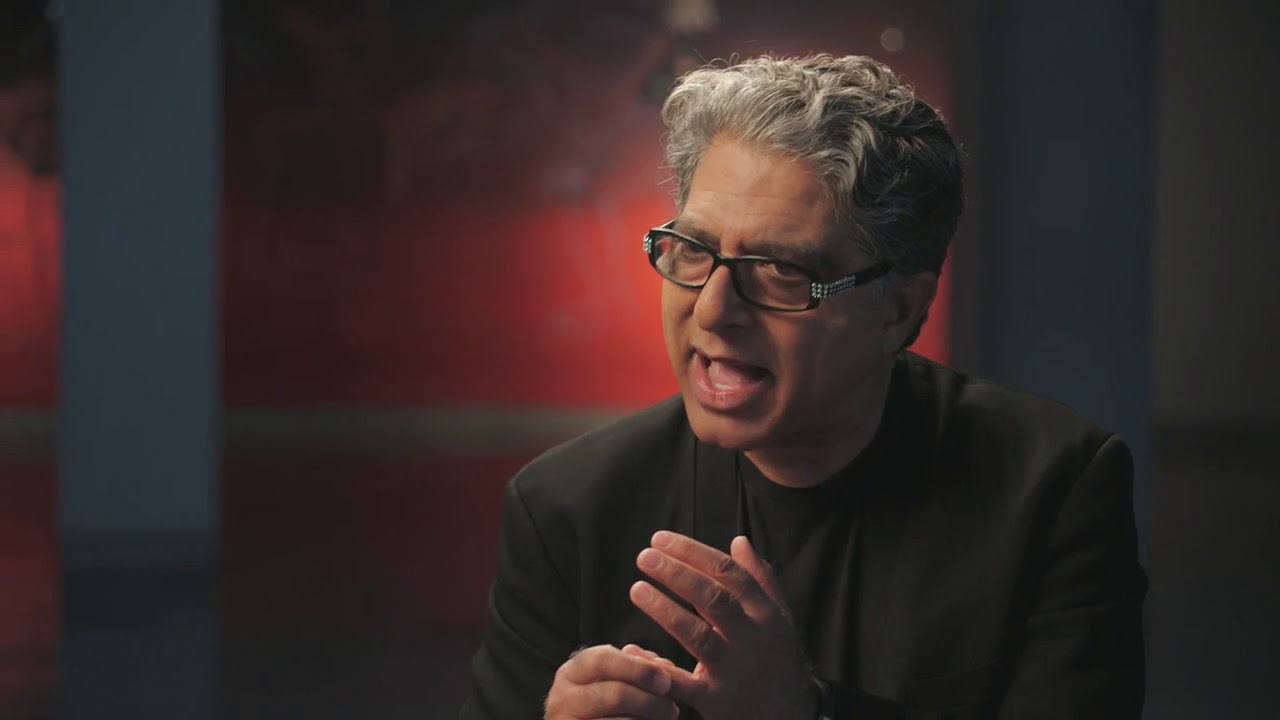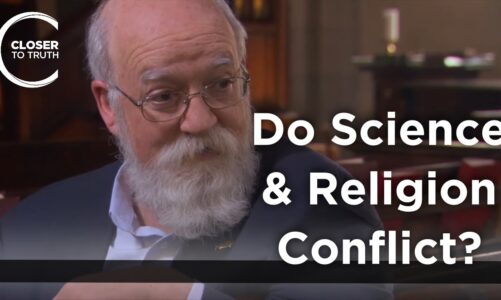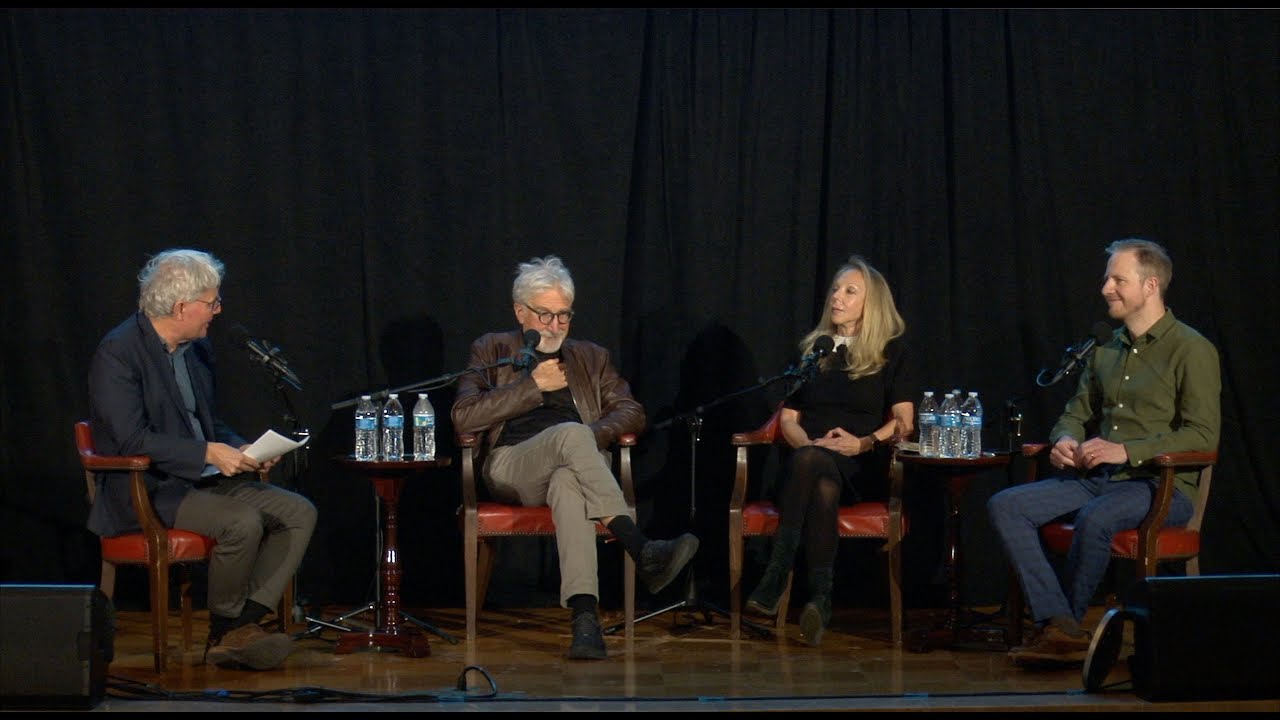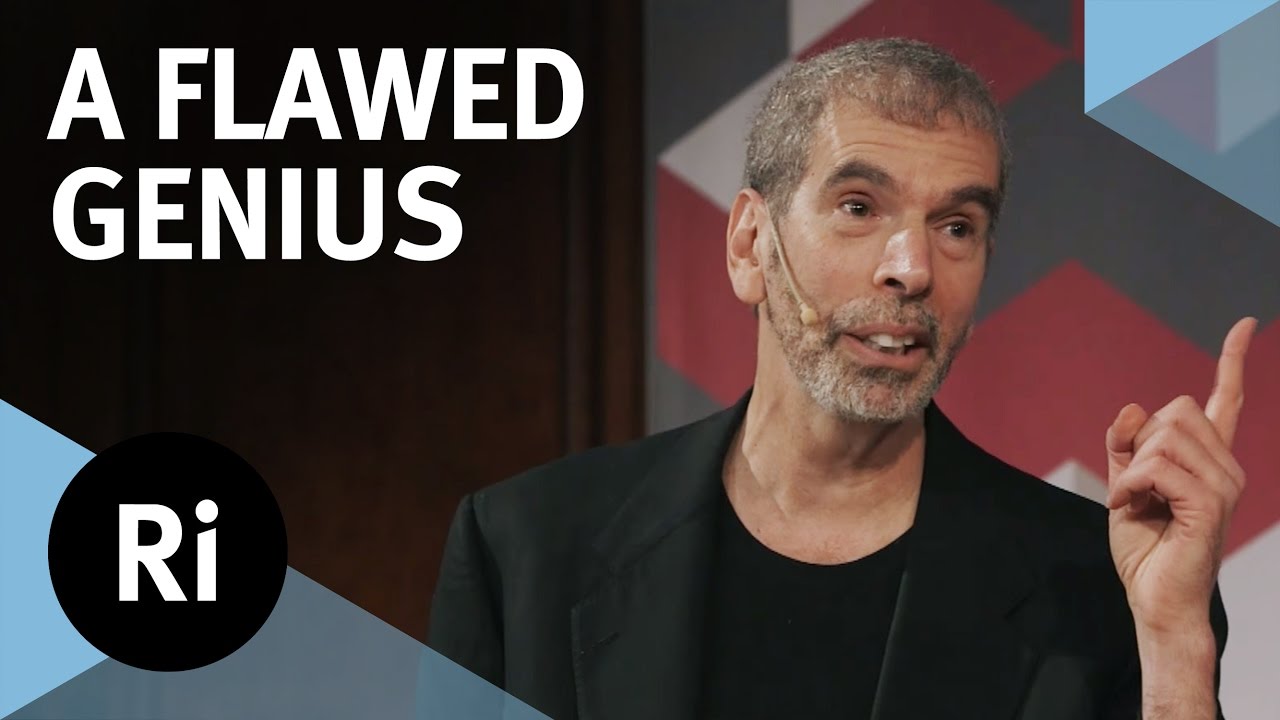Closer To Truth
What is Consciousness?
Free access to Closer to Truth’s library of 5,000 videos: http://bit.ly/2UufzC7
Consciousness is what we can know best and explain least. It is the inner subjective experience of what it feels like to see red or smell garlic or hear Beethoven. Consciousness has intrigued and baffled philosophers. To begin, we must define and describe consciousness. What to include in a complete definition and description of consciousness?
Watch more interviews with Deepak Chopra: http://bit.ly/2ZjPZSC
Watch more interviews on consciousness: http://bit.ly/2PQPaxG
Source




Closer to dumb.
Those of us in religion were taught that we are souls and spirits in material bodies, and that we either succeed in being enlightened (saved) or fail to be enlightened (lost). Such nonsense. That word "soul" suggests that the self can travel after death of the material body, and the word spirit suggests that we were created by a spiritual creator, that will either end up loving our souls for eternity, or rejecting them for eternity, unless we obey the creators dictatorial regime. I suggest that there isn't any such invisible things as soul or spirit given to human animals, and that when the cells in bodies die, the energy that was in those cells, transfers to other cells, in other forms of life. If the universe in one form or another always existed, which is what Stephen Hawking believed before he died, then creation and a creator is nothing other than myth, and suffering of all forms of life is natural, and that as human animals, we are nothing special at all.
What a waste of time interviewing this clown 🙄
Deehack Chopra and his ridiculous woo, ugh
he speaks from a place few ever find
What is all the background clicking in these videos … very annoying.
Very proud of Chopra. If Brian Cox or Sam Harris were here, they'd be arrogantly posturing and criticising him for 'word salad'. I am glad Chopra prefaced his statements immedietely this time with 'Vedanta' so these overly rational idiots do not misrepresent or spit at him for speaking Vedantic knowledge. They should be ashamed, and frankly I am pleased with how he verbalised these points.
Life is consciousness
so do I need deepak chopra to explain consciousness to me?…. give me a break!!
Could quantization of neuron signal perceptions in brain produce subjective feeling / awareness or sense of consciousness through time interaction of probability waves?
His comments on science is right. It produces a partial kind of truth only, and has nothing to say about more important things like how to live a happy life, how to help other instead of having wars, etc.
What a blaggard! And he is notable for how arrogant and self certain he is- in contrast with both the interviewer and all of his other guests I have seen. Chopra doesn't know truth for sure any more than anyone else. He just seems to think he does.
Western thinkers have difficulty separating the idea of consciousness from conscious awareness. Conscious awareness invokes the subject/object dichotomy. Consciousness is the prior ground state DC alludes to. I wish he had expanded on this a bit. Consciousness is the ground state that cannot be known by any thought system. A state generally ignored by western systems.
Oh ffs Deepak is the furthest from truth possible
Nice!
Ooowa.I watched it again. DC, like everyone else if you believe there’s a human species, can not create a thought. We can prove that for ourselves.
Thank you.
The “ground” as KM called it. 🥰Eternal. 🌈
I will provide solid arguments proving that consciousness cannot be generated
by the brain. Many argue that consciousness is an emergent property
of the brain, but it is possible to show that such hypothesis is
inconsistent with our scientific knowledges. In fact, it is possible
to show that all the examples of emergent properties consists of
concepts used to describe how an external object appear
to our conscious mind, and not how it is.
In other words, they are ideas conceived to describe or classify,
according to arbitrary criteria and from an arbitrary point of view,
certain processes or systems. In summary, emergent properties are
intrinsically subjective, since they are based on the arbitrary
choice to focus on certain aspects of a system and neglet other
aspects, such as microscopic structures and processes.
Here comes my first argument: arbitrariness, as well as subjectivity,
implies the existence of a conscious mind, who can choose a specific
point of view and arbitrary criteria. It is obvious that consciousness cannot be considered an emergent property of the physical reality, because consciousenss is a
preliminary necessary condition for the existence of any emergent
property. We have then a logical contradiction. Nothing which
presupposes the existence of consciousness can be used to try to
explain the existence of consciousness.
Here comes my second argument: our scientific
knowledge shows that brain processes consist of sequences of
elementary physical processes; since consciousness is not a property
of elementary physical processes, then a succession of such processes
cannot have cosciousness as a property. In fact we can break down the
process and analyze it moment by moment, and in every moment
consciousness would be absent, so there would never be any
consciousness during the entire sequence of elementary processes.
Here comes my third argument:
It must also be considered that brain processes consist of billions
of sequences of elementary processes that take place in different
points of the brain; if we attributed to these processes the property
of consciousness, we would have to associate with the brain billions
of different consciousnesses, that is billions of personalities, each
with its own self-awareness and will; this contradicts our direct
experience, that is, our awareness of being a single person who is
able to control the voluntary movements of his own body with his own
will.
Here comes my forth argument:
Consciousness is characterized by the fact that self-awareness is an immediate
intuition that cannot be broken down or fragmented into simpler
elements. This characteristic of consciousness of presenting itself
as a unitary and non-decomposable state, not fragmented into billions
of personalities, does not correspond to the quantum description of
brain processes, which instead consist of billions of sequences of
elementary incoherent quantum processes. From the physical point of
view, the brain is not a whole, because its quantum state is not a
coherent state, as in the case of entangled systems; the very fact of
speaking of "brain" rather than many cells that have
different quantum states, is an arbitrary choice. This is an
important aspect, because, as I have said, consciousness is a
necessary preliminary condition for the existence of arbitrariness.
So if a system can be considered decomposable and considering it as a
whole is an arbitrary choice, then it is inconsistent to hyotehsize
that such system can have or generate consciousness, since
consciousness is a necessary preliminary condition for the existence
of any arbitrary choice.
Based on these considerations, it would be completely unreasonable to
assume that consciousness is generated by brain processes or is an
emergent property of the brainI will provide solid arguments proving that consciousness cannot be generated
"molecule doesn't exist" okay
I'm kind of surprised at all the glowing comments on this load of balderdash from Mr. Chopra.
Chopra is classy!
So…scientists don’t talk about what happened before the Big Bang in space or time bc they know that’s when both appear to have began.
Only pseudo science experts talk about things, or serious scientists that do challenge the Big Bang with competing theories.
The problem is that Deepak here will tell you what happened and what scientists can’t tell you if you’ll just buy his latest book on the “quantum consciousness “ .
Talk about taking advantage of how ignorant most people are about science.
Go Deepak!! 🕊️💖🙏
♥️ transcending the subject object split; buying big bang theory, relative cosmology instead of absolute cosmology that is consciousness; framing ideology as truth ♥️
❤️ system of thought is a map ♥️
+0: subject
Maitrey: consciousness
-0: object
❤️ consciousness as common ground of experiences, prior to subject object split ♥️
This was great 👍
This is the only guy that make sense among all your interviews on consciousness
Think of Consciousness or the underlying Absolute as the number 0. Is Zero a true nothing? Is it a stand-alone number? Or is 0 the something that contains the everything, contains the infinite within it?
Science/Physics is essentially divided into two camps – one believing that there can be such a thing as a true void/nothing and the other believing that there is no such thing as a true nothing.
Spiritual proponents are obviously those who believe that there is no such thing as a true nothing. The Absolute (zero) manifests as the infinite relative (everything and its opposite; including this and other universes) and therefore remains in equilibrium (manifesting as not just physical properties such as matter and anti-matter, but also as emotions and other intangible attributes including their opposites/complements). Just as the number 0 can be thought of as containing infinite numbers within it (positive and negative) and always remaining in balance.
There is no disconnect between the Absolute and the Relative – the Absolute IS the Relative just as (Divine) Energy = Mass/Matter.
Zero can be said to possess the following properties – contains infinity, without beginning or end, eternal
From the perspective of the 0, there has been no change or no passage of time. If the 0 splits itself into a +1 and a -1, what has changed and what time has passed? As long as the individual numbers remain too focused/obsessed with their own attributes, their view remains fragmented and they are condemned to re-manifest or re-incarnate as the other numbers they had judged, so that they may perceive reality from a different set of eyes/shoes and arrive closer to the truth.
If one is able to view everything from the perspective of the 0, that is, experience what the cosmos is experiencing, experience others' joys as their own and experience others' pain/suffering as their own, then one has attained equilibrium/moksha, just as the 0 is in equilibrium. The simultaneity of all experiences brings about equilibrium.
Everything is just one infinite continuum – human desire for spatial and temporal simplicity and convenience has caused us to dissect this continuum into narrower and narrower slices and label them as living, non-living, good, bad etc. It's not wrong to do so but that is the nature of the Relative.
To answer Robert Lawrence Kuhn's question, I do not think Consciousness has a choice any more than 0 has a choice not to manifest as the infinite. Our very existence is simultaneously creative, as well as disruptive and destructive, just as the Zero's.
What we deem to be "good" and "normal" for ourselves is disruptive and destructive for other humans, other species, eco-systems, other things we have classified as non-living, and so on.
As a philosopher once said "To value too greatly or too little a particular human attribute in its relation to the rest, is to disintegrate the natural wholeness of human personality. To value the spiritual over the material or the material over the spiritual is to create conflicts within ourselves and with the rest of the world."